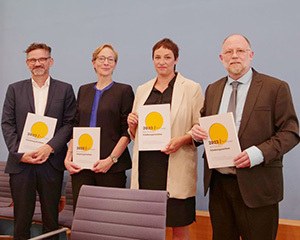Peace Report 2023 \ Still far from peace

Berlin, 12 June 2023.
Press release with the key recommendations of the Peace Report 2023
In the second year of Russia's war of aggression against Ukraine, there is no end in sight to the violence, and the global implications are becoming increasingly apparent. European NATO countries should prepare for long-term support for Ukraine. This is the assessment of Germany's leading peace and conflict research institutes in their Peace Report 2023, presented today. The institutes also recommend sanctioning the Wagner Group, expanding multilateral arms control, and strengthening unstable societies in the Global South. The Peace Report 2023 presents clear recommendations for German policy after the "turn of the times".
There will be no peace in Ukraine for a long time - on the contrary, it is becoming apparent that the Russian invasion, which is against the international law, will develop into a war of attrition that will continue for a long time. The leading German peace research institutes expressly warn against ceasing military support for Ukraine and to rely solely on negotiations, as individual social groups in recent months demand. The consequence would be that Russia would continue its expansionist drive and the security situation would worsen throughout Europe, the researchers say. Weapons deliveries and training assistance remain necessary so that Ukraine can defend itself. At the same time, negotiations should already be prepared now, which should be linked to extensive security guarantees for Ukraine. The German government could play a central role in this and seek an international negotiating initiative.
An increasingly important role in violent conflicts worldwide is played by non-state armed mercenary armies, most notably the Russian Wagner Group. Since it often escapes the direct control of its clients, this group employs particular brutality, underminining international peace missions and thus contributing to the destabilization of entire regions, such as in the Sahel. The German government, the peace research institutes demand, should classify the Wagner Group as a criminal group and place it on sanctions and wanted lists.
In 2022, global conflict levels remained high. Half of the armed conflicts took place in Africa. One in two intra-state conflicts there involved transnationally operating jihadist groups, such as the so-called Islamic State (IS).
Increasing poverty, the effects of climate change and social polarization are further risks to peaceful coexistence in Germany, Europe and worldwide. In times of these multiple crises and complex challenges, a change of era understood purely in terms of defense policy, which relies primarily on the expansion of military capacities, would not be sufficient. On the one hand, development policy strategies must be developed to strengthen the resilience of particularly vulnerable societies in the Global South and to guarantee the food security of the population. On the other hand, Western democracies also need strategies to counteract social polarization and protect themselves against disinformation campaigns and anti-democratic ideologies.
Economic integration cannot guarantee peace, but it can at least promote it if certain economic dependencies, for example in the energy sector, are avoided. The scientists therefore warn against hastily and unilaterally reducing trade relations and economic interdependencies, e.g. between Western states and China. Negotiations, dialogue and trade should continue to serve as a means of securing peace. Isolating Russia in major international organizations would not be strategically expedient, despite the blatant breach of international law vis-à-vis Ukraine. Particularly in the current situation, international forums for exchange such as the UN or the OSCE are urgently needed in order to engage in dialogue about de-escalation options and to be able to voice criticism.
In view of the tense global political situation, everything possible should be done to prevent an arms race and the further proliferation of weapons of mass destruction and to reduce the risk of escalation. Among other things, it is important to ensure functioning communications and the security of command and control structures, especially in crisis situations. States that have not been at the center of arms control policy to date, such as Brazil, India or China, should be more closely involved than they have been to date.
The Peace Report 2023 calls for the more consistent implementation of a value-oriented feminist foreign and development policy. It must position itself more decisively than before and openly discuss dilemmas.
The Peace Report is available for download free of charge (in German): www.friedensgutachten.de
About the Peace Report
The Peace Report is the joint yearbook of the German Institutes of Peace and Conflict Research (BICC / PRIF / IFSH / INEF). It has been published annually since 1987. Researchers from various disciplines investigate the realities of conflicts in various countries around the world. Their analyses are the basis for the Editors’ Statement, which summarizes and assesses the results and formulates policy recommendations for peace and security policy in Germany and Europe.
Please find more information at friedensgutachten.de










